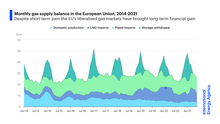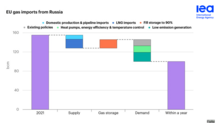

Russia supplies a significant volume of fossil fuels to other European countries. In 2021, it was the largest exporter of oil and natural gas to the European Union, (90%)[1][2] and 40% of gas consumed in the EU came from Russia.[3][4]
The Russian state-owned company Gazprom exports natural gas to Europe. It also controls many subsidiaries, including various infrastructure assets.[5] According to a study published by the Research Centre for East European Studies, the liberalization of the EU gas market drove Gazprom's expansion in Europe by increasing its share in the European downstream market. It established sale subsidiaries in many of its export markets, and also invested in access to industrial and power generation sectors in Western and Central Europe. In addition, Gazprom established joint ventures to build natural gas pipelines and storage depots in a number of European countries.[6]
The dependency on Russian fossil fuels poses energy security risks for Europe.[7] In a number of disputes Russia used pipeline shutdowns, which motivated the European Union to diversify its energy sources.[8] The rapid expansion of renewables in the European energy market would allow for less imports. As a reaction, Russia is expanding its export abilities towards China, as it has only one pipeline.[9][7] The 2022 Russian invasion of Ukraine caused the Russia–European Union gas dispute. The European Commission and International Energy Agency presented joint plans to reduce reliance on Russian energy, reduce Russian gas imports by two thirds within a year, and completely by 2030.[10][11] In May 2022, the European Union published plans to end its reliance on Russian oil, natural gas and coal by 2027.[12] In the wake of Russian invasion of Ukraine, Russia's role in the EU energy market has collapsed. Due to EU sanctions, Russia's weaponization of gas supplies, and the sabotage of the Nord Stream pipelines, Russia delivered only around 60 BCM of gas to the EU in 2022. By contrast, in 2021, the EU imported 155 BCM of Russian gas, which accounted for about 45% of its total gas imports. If the pipeline flows remain at current levels, it is likely that Russia will supply around 25 BCM of piped gas to the EU over the course of 2023.[13]
- ^ "EU imports of energy products - recent developments". ec.europa.eu. Retrieved 5 March 2022.
- ^ "In focus: Reducing the EU's dependence on imported fossil fuels". European Commission - European Commission. Retrieved 26 September 2022.
- ^ International Energy Agency (3 March 2022). "How Europe can cut natural gas imports from Russia significantly within a year". IEA. Retrieved 5 March 2022.
- ^ "Germany and the EU remain heavily dependent on imported fossil fuels". Clean Energy Wire. 22 June 2015. Retrieved 19 October 2022.
- ^ https://aei.pitt.edu/57997/1/gp_eu_en_.pdf [bare URL PDF]
- ^ Koszalin, Andreas Heinrich (5 February 2008). "Gazprom's Expansion Strategy in Europe and the Liberalization of EU Energy Markets" (PDF). Russian Analytical Digest (34 Russian Business Expansion). Research Centre for East European Studies. Archived from the original (PDF) on 6 July 2011. Retrieved 23 February 2008.
- ^ a b Chandrasekhar, Aruna (25 February 2022). "Q&A: What does Russia's invasion of Ukraine mean for energy and climate change?". Carbon Brief. Retrieved 26 February 2022.
- ^ Cite error: The named reference
:1was invoked but never defined (see the help page). - ^ Birnbaum, Michael; Mufson, Steven (24 February 2022). "E.U. will unveil a strategy to break free from Russian gas, after decades of dependence". Washington Post. ISSN 0190-8286. Retrieved 26 February 2022.
- ^ Weise, Zia (8 March 2022). "Commission plans to get EU off Russian gas before 2030". POLITICO.
- ^ Cite error: The named reference
:9was invoked but never defined (see the help page). - ^ "EU unveils 210 bln euro plan to ditch Russian fossil fuels". Reuters. 18 May 2022.
- ^ Trakimavicius, Lukas. "Protect or Perish: Europe's Subsea Lifelines". Center for European Policy Analysis. Retrieved 26 July 2023.